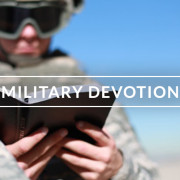Precious blood – February 18, 2022
But the LORD said to him, “Not so; if anyone kills Cain, he will suffer vengeance seven times over.” Then the LORD put a mark on Cain so that no one who found him would kill him.
Genesis 4:15
Devotion based on Genesis 4:15
See series: Military Devotions
His blood seeped into the pristine soil. It was worse than a tragedy. It was murder. It was evidence of paradise lost.
The victim’s name was Abel, beloved son of Adam and Eve. The one who ended his life was Cain, also a beloved son of the first humans placed into God’s creation.
To Cain, the Lord of life and death said, “What have you done? Listen! Your brother’s blood cries out to me from the ground.”
Thus, we sing, “Abel’s blood for vengeance pleaded to the skies.”
We ask, “What hope is there for such as Cain and us, who transgress the code of divine law in any part—not just murder?
From the future, a voice would tell Cain, “Put your hope in God, for I will yet praise him, my Savior and my God” (Psalm 43:5). The Lord of life is the only hope.
Murder stands out as one of the worst crimes. Stolen property can be replaced. A ruined reputation can be restored. Not so a snuffed-out life. Death leaves loving survivors feeling helpless, hopeless, and hurting.
Worse, when one brother kills the other brother! That’s fratricide. The anguish that seared the hearts of the first parents must have been beyond description.
How their tears must have flowed! How bitterly they must have recalled living in a world without death! How guilty they must have felt for bringing sin into Paradise!
“Unto dust shalt thou return.” They had heard this with their own ears. Little did they realize that the first one to return to dust would be their son. Bitter was the realization that Cain was not the promised one who would crush the head of the serpent. Instead, he had served as the hand of the serpent—the hand of Satan.
Both brothers had placed offerings to the one who had blessed their labors. Cain brought fruits of the soil. His brother sacrificed the firstborn of his flock. One offering was accepted. The other was rejected.
We ask, “Why?”
The answer is not found in the difference of the offerings. It lies in the contrast of the hearts.
We learn: “By faith Abel offered God a better sacrifice than Cain did. By faith he was commended as a righteous man, when God spoke well of his offerings. And by faith he still speaks, even though he is dead” (Hebrews 11:4).
Loving trust in the Lord over life and death always spells the difference between receiving divine favor or disapproval.
We are warned: “Do not be like Cain, who belonged to the evil one and murdered his brother. And why did he murder him? Because his own actions were evil and his brother’s were righteous” (1 John 3:12).
What hope was there for Cain? There would be consequences of his sin: “You will be a restless wanderer on the earth.”
Yet, the word of the psalmist, “Put your hope in God!” still applied to this murderer—as it does to all who transgress the commands of the Holy One. The mark of Cain was for his protection. He was given more time to repent and return to the Lord who offers life.
Significantly, Scripture points to another beloved son whose dying blood dripped onto hungry soil at the feet of those who murdered him. This one was the beloved of the heavenly Father. His blood calls out a message different from that of Abel’s.
“Father, forgive them!”
It is true that “Abel’s blood for vengeance pleaded to the skies.”
Yet, it is just as certain, “But the blood of Jesus for our pardon cries.”
The one we call my Savior, my God, listens to that cry. He grants that pardon.
We now only await the door opening for us to paradise regained.
Thus, we call out to one another: “Lift we, then, our voices, swell the mighty flood; louder still and louder, Praise the precious blood!” Amen.
Written and recorded by Rev. Paul Horn, WELS National Civilian Chaplain to the Military, San Diego, California.
All Scripture quotations, unless otherwise indicated, are taken from the Holy Bible, New International Version®, NIV®. Copyright ©1973, 1978, 1984, 2011 by Biblica, Inc.™ Used by permission of Zondervan. All rights reserved worldwide. Note: Scripture reading footnotes are clickable only in the web version.


